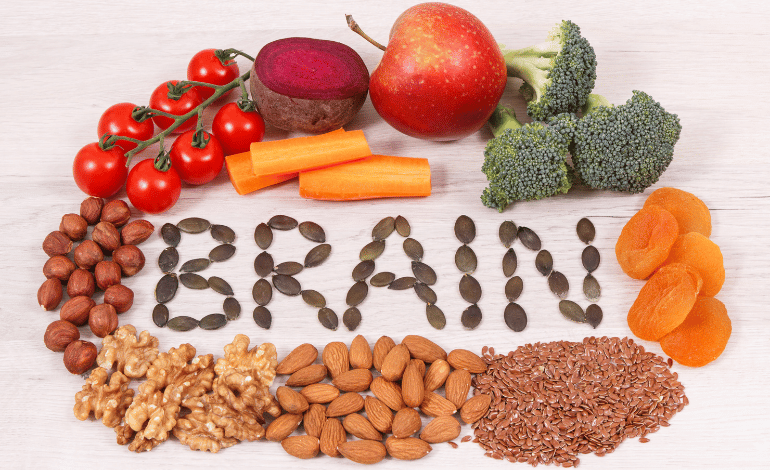How Diet and Nutrition Can Influence Brain Function

How Diet and Nutrition Can Influence Brain Function: The brain is one of the most important organs in our body. It controls all of our bodily functions, thoughts, emotions, and memories. As such, it is vital that we take care of our brain health to ensure that it is functioning at its best. One of the keyways to do this is through a healthy diet and proper nutrition. In this article, we will explore how diet and nutrition can influence brain function.
First, let’s take a look at what the brain needs to function properly. The brain is made up of about 60% fat, and it requires a steady supply of glucose, or sugar, to function properly. It also needs essential vitamins and minerals, such as vitamin B12, folate, iron, and zinc, to maintain healthy brain cells and neurotransmitter function.
Now that we understand what the brain needs, let’s explore how different foods and nutrients can affect brain function.
1. Omega-3 Fatty Acids
Omega-3 fatty acids are a type of healthy fat that is essential for brain health. These fats are found in fatty fish, such as salmon, mackerel, and sardines, as well as in walnuts, chia seeds, and flaxseeds. Omega-3 fatty acids have been shown to improve memory, concentration, and mood. They also help reduce inflammation in the brain, which is thought to contribute to conditions such as Alzheimer’s disease.
2. Antioxidants
Antioxidants are compounds that protect the body from damage caused by free radicals. Free radicals are molecules that can cause cellular damage and contribute to aging and disease. Antioxidants are found in many foods, including fruits, vegetables, nuts, and seeds. Some of the best sources of antioxidants for brain health include berries, dark chocolate, and green leafy vegetables. Studies have shown that diets rich in antioxidants can improve cognitive function and reduce the risk of age-related cognitive decline.
3. B Vitamins
B vitamins are a group of vitamins that are essential for brain health. They are involved in the production of neurotransmitters, which are the chemicals that transmit signals between brain cells. B vitamins are found in a variety of foods, including leafy green vegetables, whole grains, nuts, and seeds. The most important B vitamins for brain health are B6, B9 (folate), and B12. Deficiencies in these vitamins have been linked to cognitive decline and depression.

4. Carbohydrates
Carbohydrates are the body’s primary source of energy, and the brain requires a steady supply of glucose to function properly. However, not all carbohydrates are created equal. Simple carbohydrates, such as sugar and refined grains, can cause a rapid spike in blood sugar levels, which can lead to a crash in energy and mood. On the other hand, complex carbohydrates, such as whole grains, fruits, and vegetables, provide a steady supply of glucose and are important for maintaining healthy brain function.
5. Water
Water is essential for brain health. The brain is about 73% water, and even mild dehydration can lead to cognitive impairment. Dehydration can cause fatigue, headaches, and poor concentration, all of which can affect brain function. It is important to drink enough water throughout the day to keep the brain hydrated and functioning at its best.
In addition to these specific nutrients, it is important to eat a well-balanced diet that includes a variety of fruits, vegetables, whole grains, and lean proteins. A diet that is high in saturated fat, sugar, and processed foods can lead to inflammation, oxidative stress, and other factors that can contribute to cognitive decline.
It is also important to note that diet is just one aspect of a healthy lifestyle that can contribute to brain health. Exercise, stress management and adequate sleep are also important factors. Regular exercise has been shown to improve brain function, including memory and cognitive flexibility. Managing stress through relaxation techniques, such as meditation and deep breathing, can also improve brain function and reduce the risk of cognitive decline. Finally, getting enough sleep is critical for brain health. Sleep helps consolidate memories, and lack of sleep has been linked to cognitive impairment and an increased risk of dementia.
In conclusion, a healthy diet and proper nutrition are essential for optimal brain function. Omega-3 fatty acids, antioxidants, B vitamins, complex carbohydrates, and water are all important nutrients for brain health. Eating a well-balanced diet that is high in these nutrients and low in saturated fat, sugar, and processed foods can help reduce the risk of cognitive decline and improve brain function. In addition to a healthy diet, regular exercise, stress management, and adequate sleep are also important for maintaining optimal brain health. By taking care of our brains through proper nutrition and a healthy lifestyle, we can ensure that they are functioning at their best for years to come.
FAQS
Q1. How does the brain use glucose, and why is it important for brain function?
Ans. Glucose is the primary source of energy for the brain, and it is essential for brain function. The brain uses glucose to produce ATP, which is the energy currency of the cell. Without a steady supply of glucose, the brain cannot function properly, and cognitive function can be impaired.
Q2. What are the best sources of omega-3 fatty acids for brain health?
Ans. The best sources of omega-3 fatty acids for brain health are fatty fish, such as salmon, mackerel, and sardines. Other sources of omega-3 fatty acids include walnuts, chia seeds, and flaxseeds.
Q3. Can antioxidants improve cognitive function, and what are the best sources of antioxidants?
Ans. Yes, antioxidants have been shown to improve cognitive function and reduce the risk of age-related cognitive decline. Some of the best sources of antioxidants for brain health include berries, dark chocolate, and green leafy vegetables.
Q4. Why are B vitamins important for brain health, and what foods are good sources of B vitamins?
Ans. B vitamins are important for brain health because they are involved in the production of neurotransmitters, which are the chemicals that transmit signals between brain cells. Good sources of B vitamins include leafy green vegetables, whole grains, nuts, and seeds. The most important B vitamins for brain health are B6, B9 (folate), and B12.
Q5. What is the difference between simple and complex carbohydrates, and why are complex carbohydrates important for brain function?
Ans. Simple carbohydrates, such as sugar and refined grains, can cause a rapid spike in blood sugar levels, which can lead to a crash in energy and mood. On the other hand, complex carbohydrates, such as whole grains, fruits, and vegetables, provide a steady supply of glucose and are important for maintaining healthy brain function. Complex carbohydrates are also high in fiber, which can help regulate blood sugar levels and promote satiety.
Q6. How does dehydration affect brain function, and how much water should I drink per day?
Ans. Dehydration can cause fatigue, headaches, and poor concentration, all of which can affect brain function. The brain is about 73% water, and even mild dehydration can lead to cognitive impairment. It is recommended to drink at least eight glasses of water per day to keep the brain hydrated and functioning at its best.








